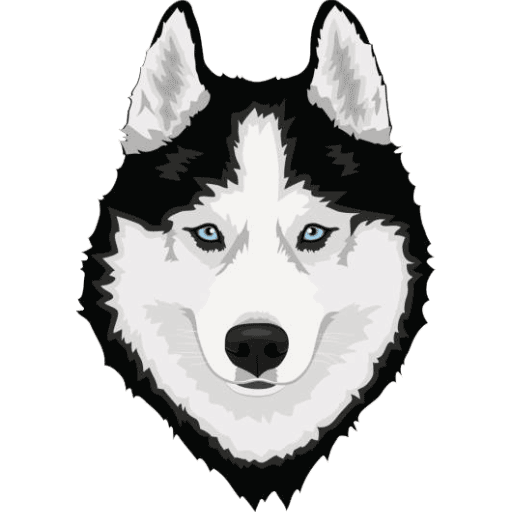Huskies are known for being one of the most energetic dog breeds. But they are just as well known for spending quite a bit of time sleeping.
How much should your Husky be sleeping? What is considered normal? Why do they sleep for so long?
You’ll be able to find the answers to these questions and more about Huskies and their sleep needs in the sections below.
How Much Sleep Husky Puppies Need
A Husky puppy can sleep for up to 20 hours per day. Husky puppies, like all puppies, tend to sleep more than their adult counterparts. Huskies need a lot of sleep because they are growing at a very fast rate and this growth uses up a lot of energy.
Don’t be surprised if your Husky constantly wants to sleep and they will grow out of it to an extent.
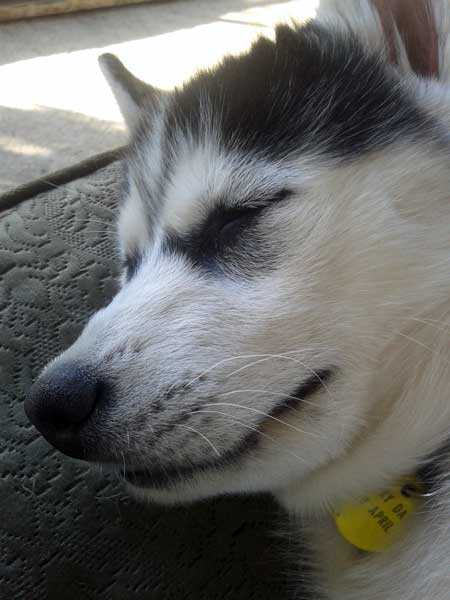
Husky puppies also burn through their large bursts of energy a lot faster than a fully grown Husky, and so need more recovery time.
Playing, exploring, exercise and learning consume a huge amount of energy, and your puppy will need to sleep more to be able to recuperate and prepare for their next bout of wakefulness.
How Much Sleep Adult Huskies Need
Adult Huskies can sleep up to 14 hours per day. The amount of sleep an adult Husky needs depends on factors including age, activity levels, medication, general health, and size.
Let’s go through these reasons so you can get a better understanding of the sleep needs of your Husky.
Age
As mentioned, a puppy is likely to spend up to 20 hours a day sleeping, whereas an adult Husky will sleep up to 14 hours a day.
As your Husky gets older, they will be able to recover from their bursts of energy a lot more quickly, and therefore need less sleep.
But that said, an adult Husky who is in their later stages of life will probably revert back to sleeping more often, just as elderly adults sleep more as they age.
Activity Levels
Huskies are very energetic dogs. Because they are exerting more energy than other breeds, they need more sleep to help them recover that energy.
A Husky that has spent several hours walking, running or doing other physical activity will probably need more sleep than a Husky who has only gone for a half-hour walk during the day.
Likewise, a Husky that has been laying around the house all day waiting for you to return home from work is more likely to sleep to tackle the boredom of doing nothing else.
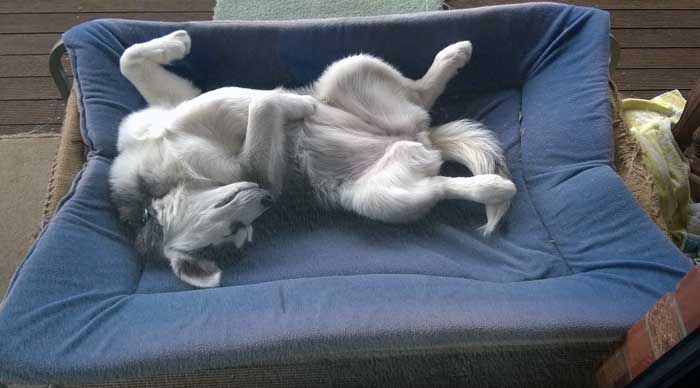
As I explain in my article on how much space does a Husky need, having a big backyard does not automatically keep your Husky active when you’re not home.
We have a big backyard and if I’m not home (or my Husky thinks I’m away), she will spend most of the time sleeping. Don’t mistakenly think that your Husky will exercise themselves when you’re away.
A Husky who hasn’t had enough exercise is also more likely to try to escape, dig holes, or destroy things. This is why exercising your Husky is so important.
Medication Taken
If your Husky is taking medication for any health problems, they might end up sleeping more than average.
A lot of medications tend to cause a drowsy effect, and this can also affect the number of hours your Husky sleeps.
If you are concerned that they might be sleeping a lot more than expected because of this, it might be a good idea to speak to your vet.
General Health
A healthy adult Husky will usually sleep between 12 to 16 hours a day. Some underlying health problems can either increase or decrease this average amount.
If you notice your Husky sleeping a lot longer than this, and they are not currently being treated for any health concerns, it might be a good idea to get them checked over by a vet. That way, you can rule out any potential problems.
Similarly, if your Husky’s sleep is less than the average, this could also signify a health concern. They may be in too much pain or too agitated to sleep and this lack of sleep, along with whatever is causing it, is going to do your Husky more harm than good. If you have any concerns about your Husky’s discomfort at all, please visit your vet.
Size
Larger breeds of dogs generally need more sleep to recuperate after bursts of energy than smaller breeds.
As most Huskies are in the medium to large size range of dog breeds, this means that they will need more sleep than a smaller breed like a chihuahua for example.
If you have several Huskies, you may also notice that the smaller ones will probably sleep slightly less than the larger ones, or will tire out far less quickly.
How to Get a Husky to Sleep at Night
Most Huskies won’t have a problem getting to sleep at night. Huskies are renowned for sleeping between 12-16 hours a day.
These hours usually extend throughout the night and include plenty of day time naps.
But if you are finding that your Husky won’t sleep as well at night, there might be a few things that you could do.
Tire them out later in the day
If your Husky isn’t sleeping through the night, it might be because they have pent up energy that they haven’t used yet.
A good way to tackle this is to exercise with them later in the day (if possible). Take them for a long walk, a run, or play with them in your yard so that they are able to use up the excess energy.
This will help to tire them out and hopefully result in them sleeping longer at night.
Mental stimulation
Give your Husky a new toy, or something to chew on. This mental stimulation will engage your Husky’s mind and hopefully tire them out so that they have a more restful sleep.
Check out this article on what types of bones your Husky can and can’t chew on.
Provide a comforting sleep place
Make sure that your Husky is sleeping in a place where they are unlikely to be easily disturbed. Places with a lot of activity or where people congregate (like near the kitchen for example) provide distractions from sleep.
Other noisy or playful pets, and even children, can deter your curious Husky from resting properly if they want to see what is going on.
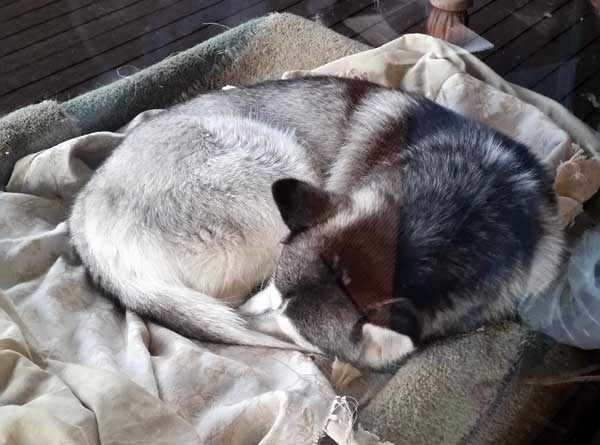
It should be no surprise that our Husky prefers sleeping in this comfy bed.
Later feeding and bathroom breaks
If you feed your Husky later in the evening, you will find that they sleep a lot better throughout the night. Most dogs and cats tend to have a good sleep after eating a larger meal.
If your Husky lives inside with you, it is also a good idea to take them outside for a bathroom break just before you go to bed. This will mean that they are able to empty their bladder and sleep through the night better, rather than waking up in the middle of the night to go to the bathroom.
Why Huskies Sleep for So Long
Huskies sleep so long because they are extremely energetic dogs, and need to recuperate after large bursts of energy.
Sometimes Huskies get negative connotations where people think they are ‘lazy’ because they sleep so often. But anyone who owns a Husky will realize that these rests are the way that they recover after expelling so much energy throughout the day.
In a similar vein to when we need a rest after strenuous exercise, Huskies need to restore their energy after running around, playing, exploring and learning.
As long as your Husky is receiving enough exercise and mental stimulation throughout the day, there shouldn’t be any concerns if your Husky is spending so long sleeping.
Why Huskies Sleep in Weird Positions
Of all dog breeds, Huskies are renowned for their most unusual sleeping positions. If you own a Husky, you’ll know all about weird sleeping positions. It’s one of the many unusual things Huskies do (link to find out more).
It is difficult for most of us to understand how their awkward-looking contortions can actually be comfortable enough to sleep in, but that is just one of the lovable quirks of the breed.
But why do they sleep in these strange positions?
Laying on back with feet up in the air
When your Husky sleeps on their back with their legs up in the air (stomach exposed) it shows that they are not worried about potential threats.
They feel safe and secure in their environment and are not worried about showing their vulnerable underbelly to potential attacks.
Some Huskies also sleep in this position when they are feeling warm, as their bellies are covered in less fur and this allows air to circulate over their skin, helping to cool them down.
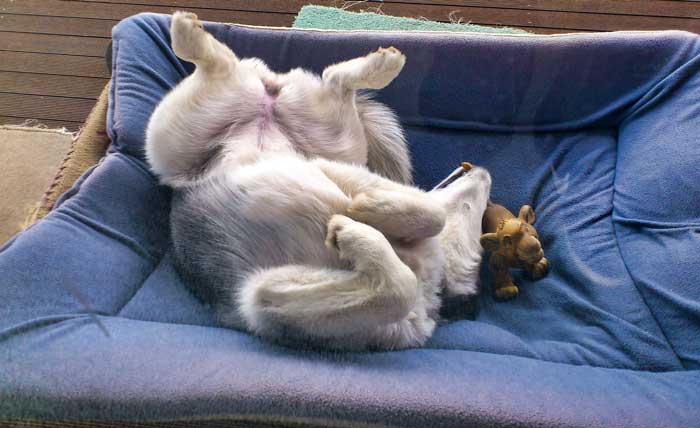
Our Husky commonly sleeps in this position. In the above photo, she had this toy lion’s tail in her mouth and every minute or so she would chew on it a couple of times.
Curled on or around something
Probably stemming from their natural instincts when they had to sleep in the snow during sledding expeditions, some Huskies prefer to sleep curled up in a ball with their tail covering their nose, or around something that provides them comfort (like a pair of shoes).
This position helps to provide protection from the elements and also retains body heat. Even if your Husky doesn’t have to sleep in these conditions, it could be more of an instinctive sleeping position.
Sleeping with other pets
Huskies like to be in packs (similar to wolves) and when they sleep close to another animal (be it another Husky or a different pet) they are extending on that pack mentality.
When this occurs, you will find your Husky either sleeping beside, back to back with, and sometimes even sprawled over the other animals. This shows that your Husky trusts them and doesn’t consider them a threat.
Sleeping on their stomach, Superman-style
A Husky sleeping in this position is always ready for action. Because of the way their body is positioned, with their belly on the floor and four legs stretched out, your Husky will be able to jump immediately to their feet on awakening.
This could also be considered an instinctive sleeping position, as it enables your Husky to be alert to anything that may be coming towards them while they are resting.
Sleeping on their side
This is probably the most common sleeping position for most dogs (not just Huskies). Their vulnerable bellies are exposed so there is an element of trust involved- they feel secure and safe and aren’t worried about being attacked.
They are also able to stretch out their legs and stay in the same position for quite a while- it is obviously less awkward and more comfortable than some other positions Huskies are known to sleep in.
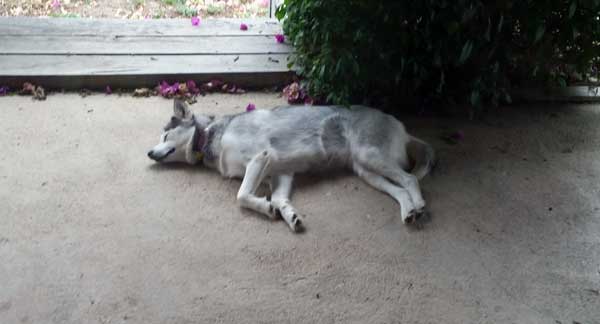
Another reason your Husky may sleep on their side is as a way to cool down. In the above photo, you can see that our Husky tends to sleep on her side when laying on the concrete in the shade.
She only sleeps this way on the concrete and we quickly figured out it happens when there’s hot weather.
Sleeping on her side on the concrete is the best way she can cool her body down compared to any other sleeping position.
Using a Crate with Your Husky at Night
Crates are useful if you need to leave your dog alone for extended periods of time (like while you are at work for example), and there is no one to supervise them.
Some people mistakenly think crates are cruel because they enclose your dog in a small space and don’t allow them to wander. But a lot of Huskies (and other breeds) prefer to sleep in crates.
Crates can provide a sense of security for Huskies, as they can compare them to the dens that they dig for themselves if out in the elements. You can make the crate cozier for your Husky by lining it with soft blankets and putting their favorite toys in there to play with.
Crates can also be useful if your Husky is trying to escape at night or likes to get up to mischief when it gets dark.
If your Husky is in a crate during the night, they will be unable to get out and will be more likely to sleep.
Can Huskies Sleep Outside in Winter?
Huskies can sleep outside in winter, but if you have the means to keep them in a warm, enclosed space out of the elements, then you should. With their thick, double-lined coats, Huskies were bred to be able to withstand extreme cold and icy conditions.
Learn how a Husky’s double-coat helps them deal with extreme weather in this guide.
A Husky in these conditions will usually dig themselves a den and then curl up inside to sleep.
A Husky will curl up and sleep with their tail over their nose to stay warm in cold weather. Their fluffy tails stop any cold wind or rain from reaching their nose.
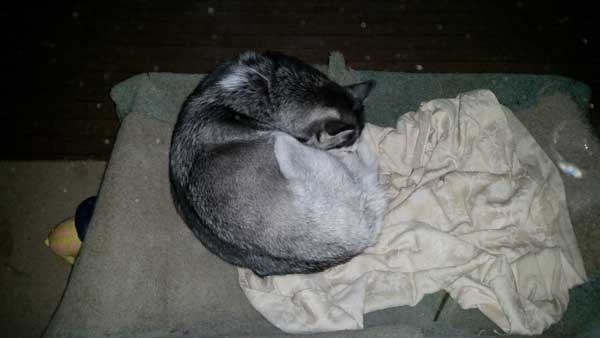
While they are able to withstand winter conditions, you should ensure that you give them a warm shelter where they can feel safe and protected.
If your Husky can come inside, you should allocate them a warm space where they can sleep. If they must remain outdoors, you should make sure that they have a dog house or space of some kind where they are able to shelter either under or in.
Pile the space with warm blankets or sheets and make the space as comfortable as possible.
Find out more about keeping your Husky outside in the cold weather in this guide.
Husky Sleeping Problems to Watch For
Most Huskies don’t have a problem sleeping in any condition but there are some things that you should watch out for, just in case it could signify a health problem or concern later down the track.
If your Husky starts to sleep for longer periods of time than they used to, and you can’t think of a particular reason for the change (like extra exercise or a new medication making them drowsy) then you should get them checked over by a vet, just to be on the safe side.
Dogs usually wake up alert after a sleep so if your Husky appears lethargic or slow after a long rest, this could also be a sign that there is something wrong.
Another indicator that there could be a problem is if your Husky is not getting a night of restful sleep. This could be obvious if they are constantly shuffling around, showing discomfort, whining and changing positions during sleep.
You should get them checked by a vet if you notice any of these problems because they may have an injury or illness that you are not aware of that is affecting their quality of sleep.
If they are not able to sleep well, it will take them longer to recover from any problems they may have.
Husky Sleeping FAQs
Here are some common questions you may have about your Husky’s sleeping needs.
Do Huskies ever get tired?
Like all animals, Huskies get tired. Because they are such an energetic breed, they need to sleep and rest after each burst of energy so that they can recover.
They sleep so much throughout each day because they are tired after expending so much energy.
Why does my Husky sleep under the bed?
Huskies (and a lot of other breeds of dog) like to sleep in enclosed spaces because it reminds them of sleeping in dens. When your Husky sleeps under the bed, it is considered an enclosed space because your blankets are likely to drape over the space, making it seem closed in and cosy.
They usually tend to feel more secure and safe within this space.
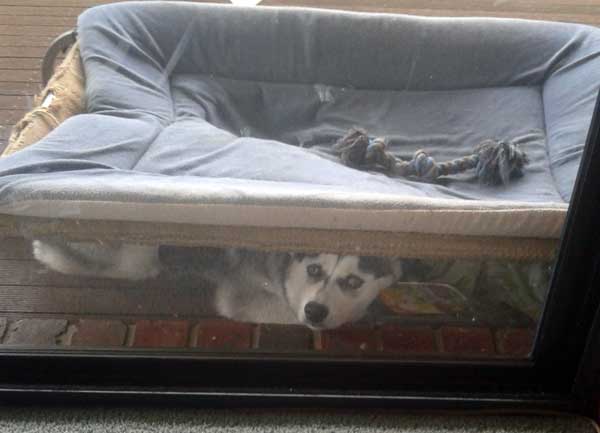
Fortunately, our Husky quickly grew out of this habit once she learned how comfy her bed was.
Should you let your Husky sleep with you?
This is a personal preference. It is up to you whether you want to sleep with your Husky or not.
I have one friend who shares her bed with her Husky and while she enjoys the closeness during cold winter nights, it isn’t as pleasant for her to be covered by a sprawling large Husky during the warmer summer months.
She also doesn’t end up with much space (despite having a large bed) because her Husky likes to spread out while sleeping.
If you’re not a fan of dog hair over everything, then I wouldn’t suggest letting your Husky sleep with you. However, if you want to have them sleep nearby, you can create a space within your room that they can sleep in.
Just make sure you set firm boundaries about where they are and aren’t allowed to go.
Do Huskies Sleep in the Snow?
Huskies can sleep in snow and to deal with the cold they usually dig themselves a den and curl up within it (with their tail over their nose).
But if you have the means to provide them with a warm and protective shelter, you should do so.
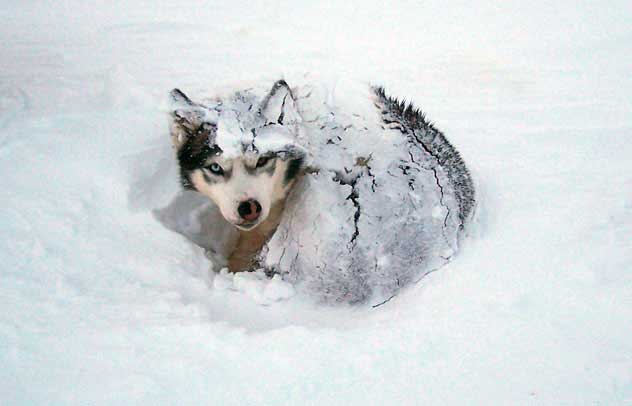
Want to keep your Husky healthy and improve their sleep quality? Exercising your Husky is a crucial part of keeping your Husky healthy.
Find out how to train your Husky to run with you in this guide or find out how to train your Husky to enjoy swimming in this guide.
